Table of Contents
- Queensland Culture
- Queensland Political Culture & The Age of The Individual
- Queensland Politics
- Queensland Parliament
- Government Workplace Culture
- The Greek and The Soldier
- The Priest, The Bookie and The Sailor
- Other Mates
- Long Lunches and Guns in the Workplace
- Queensland Political Culture and Neoliberal Changes in Cairns
- Queensland Political Culture: Tied Up in Controversy
- A Far Northern Tragedy
- One Bourbon, One Scotch and One Beer
- Rebellion and Settling Down
Queensland Culture
Gordonvale High and Queensland Politics
Queensland political culture provided an interesting and sometimes uncomfortable backdrop to my life growing up. However, life continued to offer me the enjoyment and opportunities of a rural regional upbringing.
Indeed it is hard to imagine a more enjoyable school environment than we had at Gordonvale State High. The school was two stories high, with a large green expanse of playing fields at the rear.
My time at Gordonvale High was characterised by mediocrity, both in sport and academic endeavours. I spent much of my time trying to understand the world and my place in it.
Two defining characteristics of my life at this time were self-doubt and a rebellion against authority. My father Tom was Mayor of the Mulgrave Shire, so a senior figure in our local community. Consequently, he attended meetings with prominent identities in Queensland politics, including Government Ministers and the Premier.
Rebel Without a Cause
It is hard to say whether I was rebelling against my father’s authority, or the political order of the day. There was certainly much to rebel against politically at this time. The ultra-conservative nature of Queensland politics ensured that.
Teenage years are a time of new experiences and the feeling of being alive to all life has to offer. At Gordonvale State High I experienced the excitement of my first love, first beer and my first joint. I loved breaking the rules, often behind the wheel of a car or on a motorbike.
Risking your life when so much of it lays ahead of you was an irony not lost on me. Nor was it unique to me. I lost a number of school friends during year 12 and subsequent years, primarily in motor vehicle accidents.
Political Views Formed
I valued my individuality and my right not to conform or follow orders. However, I could see that when individuals were left to their own means for survival and advancement, the wealthy who controlled capital would always prosper. On the other hand, those who had nothing to sell but their labour always struggled.
Thus I believed in a strong role for government to ensure equity and to extend the world of opportunity to those who would otherwise miss out. I believed in policies which adopted a collective approach, where the state provided services to people according to need. Unfortunately, both nationally and globally, the policy agenda at the time was heading 180 degrees in the opposite direction!
Queensland Political Culture & The Age of The Individual
The political culture of the 1980s was dominated by theories associated with neoliberalism. Neoliberal policies promote the notion of the individual as the main social and economic actor in society. Indeed, for neoliberals, the notion of community and collective action is seen as a negative. Individual choice within a capitalist economy is believed to deliver superior outcomes.
Thatcher and Reagan
If communism represented the dominance of one political extreme, neoliberalism was the other.
Margaret Thatcher (UK Prime Minister 1979-1990) promoted the primacy of market-centred individuality at the expense of community. She said in 1987, “There’s no such thing as society. There are individual men and women and there are families. And no government can do anything except through people, and people must look after themselves first. It is our duty to look after ourselves”.[1]
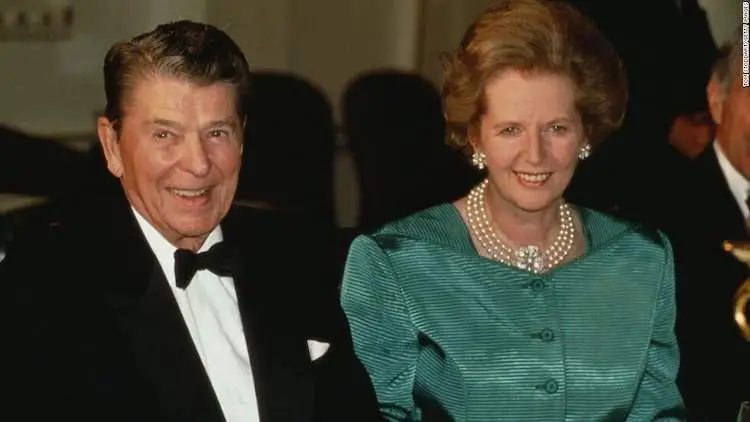
Australia was governed by the ALP’s Bob Hawke and Paul Keating for most of the 80s. They also implemented neo-liberal policies, albeit in a gentler form. This included selling off national public assets such as the Commonwealth Bank, Telecom and Qantas, while introducing Medicare.
Government Departments were reformed under a corporate guise, resulting in the loss of staff and services. The language and rhetoric of the government was inclusive. However, the harsh reality was that the 1980s saw a massive increase in inequality in Australia.
Queensland Politics
Queensland political culture was also impacted by neo-liberal policies during the 1980s, including the privatisation and corporatisation of state assets. However, the state political scene at this time cannot be seen outside the dominance of the Joh Bjelke-Petersen government. As a young man, the only Premier I had ever known was Joh Bjelke-Petersen.
Queensland Political Culture and Corruption
Corruption was widespread in Queensland. Sex work and illegal gambling were widely practised. As a consequence, much of the police corruption was based on income from gambling and prostitution. Police were paid handsomely by those who ran brothels and gambling dens to ‘look the other way’.
The social conservatism in Queensland politics stood at odds with my beliefs, which were distinctly radical. I had no respect for Joh or the Queensland government.
When people turned out to protest against the all-white Springbok rugby tour in 1971, Joh declared a state of emergency. He authorised the use of force against protesters.
Bjelke-Petersen proclaimed, “The day of political street march is over. Anybody who holds a street march, spontaneous or otherwise, will know they’re acting illegally. Don’t bother applying for a march permit. You won’t get one. That’s government policy now.” [2]
Joh Bjelke-Petersen was the longest-serving Premier of Queensland. A conservative, he ruled from 1968 until 1987. Born in New Zealand in 1911, he entered politics in 1947 as the National Party MLA for Nanango. Bjelke-Petersen was an autocratic leader who relied on a police force rife with corruption to prop up his government. Dissenters faced brutalisation at the hands of police when they took to the streets to protest.
Queensland Parliament
Many Queenslanders lived in blissful ignorance of the poor state of democracy. “Some suspected malfeasance but found it easier to look the other way. Others happily walked this path with Joh, totally endorsing what he and his police were doing.”[3]
Looking the other way became decidedly more difficult after ABC journalist Chris Masters went to air with the Four Corners episode, “The Moonlight State”.
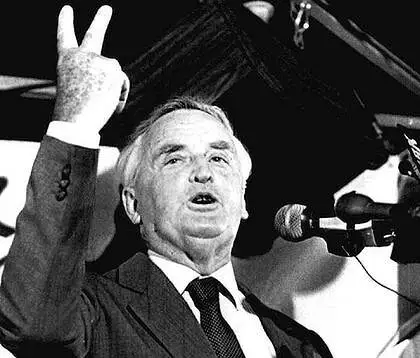
Masters highlighted the shocking level of official and police corruption. This marked the beginning of the end for Joh and his National Party Government.
The long reign of authoritarianism that operated under Joh came to an end in 1989. A Royal Commission was called into the police and official corruption in the state of Queensland. The inquiry, led by Ross Fitzgerald, became forever known as the ‘Fitzgerald Inquiry‘.
Just as the Hanlon Labor government stomped down on political protest and left-wing activists like Fred Paterson, the Joh Bjelke-Petersen government was determined to use the powers of the state to shut down dissidents and silence political opposition. To this end, the government used the services of the Special Branch.
The Special Branch was a secretive arm of Queensland Police that operated from the 1940s to the 1980s.[4] Early internal reports from the 1940s show the Special Branch was tasked with launching “investigations into subversive organisations and their subsidiary bodies”. Communism was a key concern.
Queensland Political Culture and Civil Liberties
Visiting my sister in Brisbane in 1985, I accompanied her to attend a political gathering organised by the Democratic Socialist Party. Participants attending the gathering took every precaution to ensure that they had not been followed by undercover ‘Special Branch’ operatives. This was not paranoia, because at the time the Special Branch maintained files on political activists from the left – especially those who supported socialist policies and civil liberties.
Civil libertarian lawyer Terry O’Gorman recalled that the Special Branch was a “thoroughly insidious organisation”. They kept files on students, some of whom had never committed violence, hindering their prospects of obtaining public sector jobs.
In an article published in the Brisbane Times, O’Gorman recalled, “The Special Branch was used in an overt political manner by the Bjelke-Petersen Government. Used to ruin careers of students who did nothing worse than protest against the policies of the Bjelke-Petersen government.”[5]
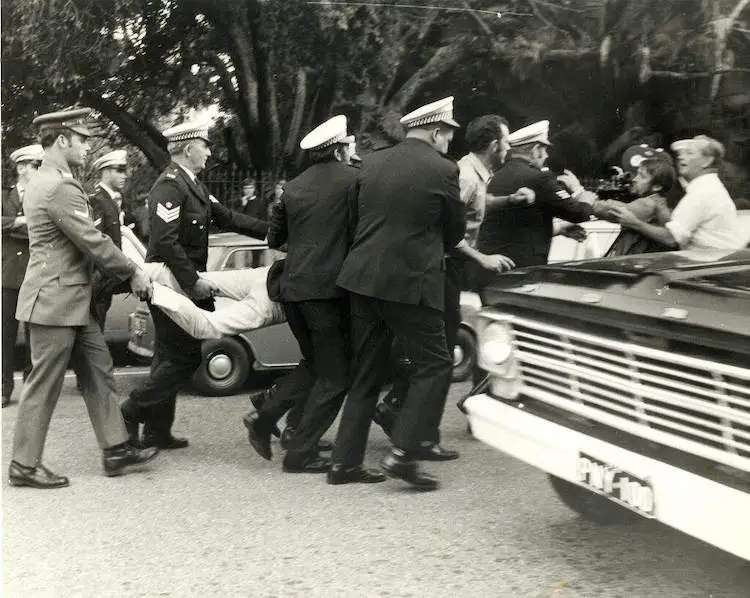
Sam Watson and Resistance
The Bjelke-Petersen Queensland Government was determined to keep an eye on Aboriginal activists. One of the prominent activists at this time, and a well-known Birri Gubba man, was Sam Watson. As a socialist and an aboriginal, Sam ticked all the boxes for special attention.
Sam’s lifelong activism began as a teenager, organising for the 1967 referendum on the constitutional recognition of Aboriginal people. He helped establish the Aboriginal Tent Embassy in Canberra and many indigenous community organisations. Consequently the Special Branch kept a close watch on Sam Watson!
Queensland Political Culture and Police Brutality
Sam recalled, “In 1970, we were running a very active anti-Vietnam campaign with regular rallies, marches and protest meetings. The Special Branch were always there in the background. They raided our place every couple of weeks.” He recalled with humour how officers tried to infiltrate some of the leadership groups. “There were clandestine officers dressed in hippy gear”, he laughed.
However, confrontation with the police could have vicious consequences. Sam recalled the mood as protestors marched out of King George Square in Brisbane and into a bank of uniformed police, five men deep in October 1977. “There was this terrible, almost overwhelming terror that we were going to be bashed by the police, and we were.”
Queensland politics was characterised by this high degree of brutality and a terrible feeling of absolute fear. However Sam never wavered from what he saw as his duty to stand up to a brutal regime.
Sam Watson Remembered
For over half a century, Sam Watson made a significant contribution to campaigns for the advancement of Aboriginal and Torres Strait Islander people and many other social justice causes.
Following his death in 2019, his daughter Nicole said it best, “Sam had two great loves in his life, his community and his family. His heart would almost burst with pride at each Invasion Day rally, as he witnessed our young people assume the reins of the glorious struggle. But Dad also cherished nothing more than spending time with his precious grandchildren.”[7]
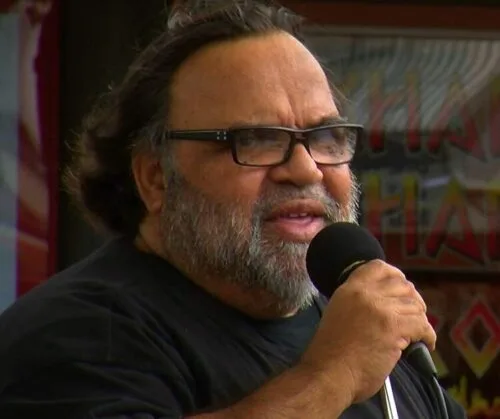
Government Workplace Culture
Despite my hostility to the ruling regime, one of my first jobs was working for a Queensland Government department. I managed to find my niche working as a clerk at the Public Trustee. In those days the Public Trustee was located in the heart of the city on the corner of Abbott and Spence Streets, bordering on a green oasis known as Anzac Park.
The casual pace of life in the Public Trustee stood in contrast with the busy pace of the city. However, Cairns in those days was much more relaxed than the Cairns of now. Life was relaxed at the Public Trustee but it was never boring – the characters who worked there saw to that.
For example, Allan ‘Dick’ Whittington worked in deceased estates. Also from Edmonton, he was a regular at the Hambledon Hotel. Dick was a great mate over many years. We enjoyed more than a couple of beers together at the Cairns Masonic Club, which was located in Abbott Street.
The Greek and The Soldier
I also became good friends with a man by the name of Robert Lazarus. ‘Robbie’ or ‘Lazzo’ as we alternatively knew him, came from a well-known local Greek-Australian family. Short statured and quick with a joke, he was our ‘Wills Officer’ for the region.
A former rugby league player for Kangaroos and Cairns, he was still quick on his feet, unless it was after a two-hour lunch across the road at one of the Barbary Coast pubs. Robbie was a well-known and well-liked local character, having been the rugby league half back for Cairns, in a town that was rugby league mad.
Terry Curtin was another real local. He was a Vietnam veteran and a long-termer at the Public Trustee. The thing I remember most about Terry was his love for his two boys. He would always be meeting them in the office to take them to swimming or to play sport of some kind.
Another memory I have of Terry was that he maintained a list of every person employed by the Public Trustee of Queensland. Promotion was based on seniority or length of service. Whenever someone would pass away or retire, Terry would put a line through the name and say something like, “Right I am now number 42 in charge of this show.”
The Priest, The Bookie and The Sailor
The bloke in charge of the Public Trustee was a former Catholic priest by the name of Peter McEniery. He had committed the Cardinal sin (or perhaps we should call it the carnal sin) of meeting a woman who he loved. He was forced to leave the church to marry her.
Keith McElhinney was another good bloke. He worked administering deceased estates and transferring assets to surviving beneficiaries under people’s will. Keith was the son of a bookie and when I knew him he was running a book at the races like his dad.
Greg Brooker was in charge of the property conveyancing section, and my supervisor. Greg had saltwater in his veins and eventually resigned from the Trustee to found a business taking backpackers out to the reef on his boat. Looking back, Greg was a pioneer in the reef tourism industry.
Other Mates
Other staff included Terry Casey, Murray Saint, Graham Cann (a leading greyhound trainer), Beavan Philips, James O’Brien, Karen Jensen, Sharon Anderson, Tasia Hodgkinson, Leanne Leary, Katrina Clarke and Janet Winkworth. Winkworth Street was named after her family, a prominent local business family. One in five relationships start in the workplace, and Janet and Beavan were the glamour couple of the time, marrying in the late 80s.
Long Lunches and Guns in the Workplace
In those days, a two-hour lunch at one of the pubs across the road was not unheard of. Everyone drank, especially on every second Wednesday, which was pay day, or as Dick called it, the day the golden eagle shits. The back bar at the Cairns Returned and Services League (RSL) was another regular watering hole for the crew on Friday nights.
One work day I dropped into Bill Lee Long’s Sports Store in Lake Street. I purchased a nice pump action shot gun that was for sale. I thought nothing of walking the gun back to the office and putting it on my desk. Unbeknownst to me, this caused some stress to other members of staff, but everybody found humour in this looking back. Today it would be a major concern and laws that have been passed would probably see the SWAT team called in.
Eventually the Public Trustee building (formerly a branch of the Commonwealth Bank) was knocked down to make way for the Reef Hotel Casino, marking another step in the transition from rural community to tourist economy.
The Department moved the office to Sheridan Street at the start of the 90s. There we saw a whole lot of new characters employed. New faces included Jodie Farrell and Lauri Bryce, and my good mate Liam Nicholas. Through it all, the Deputy District Trustee Bill Butler remained. He was the local stayer. Bill had safe hands and carried the institutional knowledge from years past.
Queensland Political Culture and Neoliberal Changes in Cairns
Moving into the 1990s Cairns and Far North Queensland felt the impact of neoliberal government policies. There was no greater advocate of neoliberalism in Queensland politics than the then Labor Member for Cairns, Queensland Treasurer Keith De Lacy. He loved selling public assets.
During this time the railway yards were sold off, becoming a private shopping mall known as Cairns Central. Anzac Park on Abbott Street was sold off (along with the Public Trustee building) to a foreign investor to build a casino.
The Cairns Central School site was sold off and became a privately-owned hotel. Selling a public school was offensive to me, but it was particularly galling as my great-great grandfather had donated the land for our first school.
There were community objections to many of these sell-offs, which many of us on the left also saw as ‘sell-outs’. Indeed the greatest public protest of all came when the government sold off the Cairns Yacht Club. The club had been widely used by the community for events and get togethers. The building had real historical significance, but the ALP Government sold it anyway.
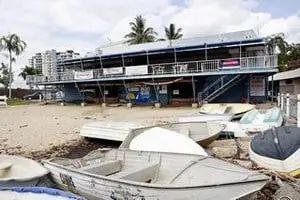
Union Delegate Rob
The public sector was not immune from these neoliberal reforms. At this time, I was a representative of Cairns public sector workers as a Queensland Public Sector Union (QPSU) delegate. The QPSU had a fairly conservative history, but together with other ALP aligned delegates we managed to change that.
The Deputy Public Trustee in Cairns at the time, Bill Butler, told me, ‘we don’t want Labor to get elected, they don’t look after public sector workers.’ I remember thinking at the time “silly old Bill must not know much about Queensland politics.” Much to my delight, in 1989 the ALP Goss Government was elected in a landslide. Unfortunately, their actions in government would go on to prove Bill correct!
Queensland Political Culture and Neoliberalism
At the Public Trustee, workloads increased under the new government, while staffing numbers went down. Departmental seniority was ditched in favour of so called ‘merit-based’ promotion. We were all to find out that the concept of merit, like beauty, was well and truly in the eye of the beholder.
Under other free market ‘reforms’ pubs opened longer, Sundays, normally a day of rest, became just another shopping day and poker machines were for the first time allowed in Queensland.
Looking back, I don’t see how the neoliberal reforms of the Goss ALP Government were in any way beneficial to working people or marginalised groups in Queensland. The poker machines and their consequences went on to cause misery in communities throughout the state and all but killed the live music industry.
Conveyancing Cancelled
I was promoted within the Public Trustee to the position of conveyancing officer. This involved handling the legal documentation for people who were buying and selling land. I loved conveyancing and helping people, many of whom could not afford a solicitor.
Alas, Premier Wayne Goss and his Attorney General Dean Wells were both solicitors and the Law Society was influential. The Queensland government instructed the Public Trustee to cease offering conveyancing to the public. This left solicitors with a monopoly over providing this important service.
Outraged, I resigned from Queensland Labor and sent a letter to the State Secretary, using the words “the ALP is dead to me”. Words which would come back to haunt me at a later date.
Queensland Political Culture: Tied Up in Controversy
Given the casual, relaxed atmosphere at the Cairns Branch of the Public Trustee, you can imagine the outrage caused when we received a memorandum from the Department Head in Brisbane, instructing us to all wear neckties while at work! It was probably not a clever move to agree to an interview when I was contacted by local journo Robert Reid, who freelanced for that old Aussie icon ‘The Australasian Post’.
Robert was much more accustomed to doing interviews than I was to being interviewed. He was a pro. He bought me a beer at Rusty’s pub to make sure I was relaxed. I slammed the bureaucrats in Brisbane who “had nothing better to do than come up with ridiculous rules like this.”
After another beer, a reference to senior staff in Brisbane as ‘pencil necked bureaucrats without balls’ just slipped out. Everyone thought it was hilarious when the next edition of the Australasian Post came out, but in truth it was a foolish foray into Queensland politics. I was lucky to keep my job.
Media Nonsense
Publicly this ‘storm in a teacup’ grew legs, and on the first day of 1990 at around 8am I received a phone call from the former Premier of Victoria, Jeff Kennett.
As I waited on hold on this 1st day of January 1990, I heard him say to listeners, “We are now going to interview a man from North Queensland about the biggest social political and economic issue of this decade!” (which was less than 8 hours old). Apart from his smart-arse introduction, the interview went well.
This issue received massive media coverage, much of it light-hearted, but I really felt that Cairns needed an image which offered a point of difference, not to be just like everywhere else – besides, it gets hot up here!
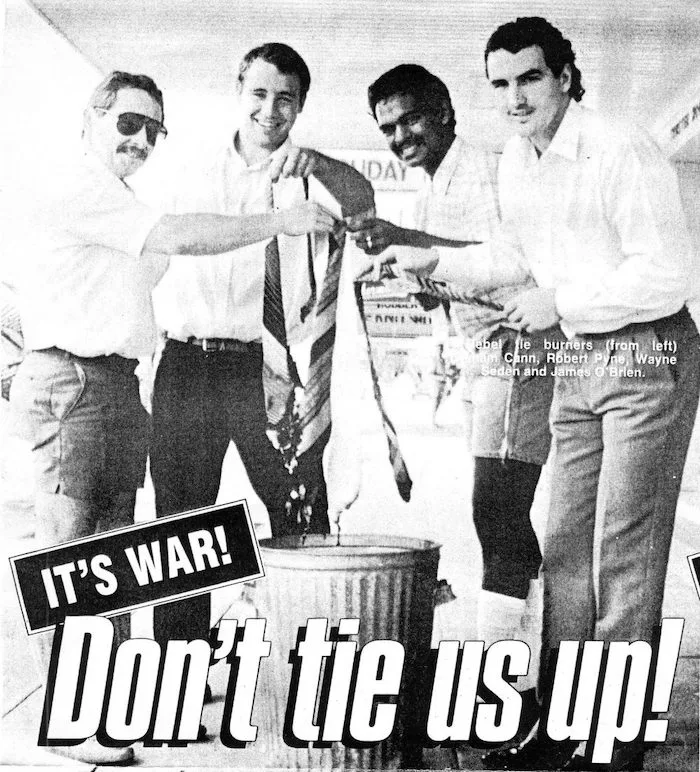
A Far Northern Tragedy
One afternoon in 1990, I saw my mother sitting beside the phone in the living room with a concerned look on her face. She had been watching television and a message had flashed across the screen: a plane carrying Far North Queensland local government officials was missing en route from Airlie Beach to Cairns.
At the time, Dad was away doing a presentation on local government management with Cairns Mayor Keith Goodwin at a conference in Airlie Beach. Naturally we were concerned. In those days many of the councils in North Qld used to hire private charter planes to take councillors to meetings in areas where there were no regular air services.
No sooner had mum informed me of the news than the phone rang. It was the media, asking mum if she had heard from dad. We both decided to stay by the phone with the television on, to find out whatever news we could, good or bad. We feared the worst.
Truth Emerges
It turned out that earlier in the day, Keith Goodwin and dad had made their presentations. Afterwards Dad tried to get on the plane bound for Cairns, but all the seats were taken. He stood envious of Keith and his other colleagues, then waved them goodbye and made his way to get on a bus, thinking, “I’d rather be with them than endure the long drive back to Cairns.” He could not have known that while the bus would safely make it to its destination, the plane never would.
On that day in May of 1990, the plane crashed into Mt Emerald and all aboard lost their lives. They were Keith Goodwin, Rose Blank, Ivan Wilkinson, Harry Rankine, Elwyn Phillips, Bruno Riedweg, Hector Wallace, Sister Nadia Giovanna del Popolo, Joseph Frederick Newman, Graham Gilbert Luxton and pilot Stan Lingren. This tragedy shook the community and robbed the Far North of some of our much loved and most respected leaders. This loss was later officially recognised by the Cairns community.
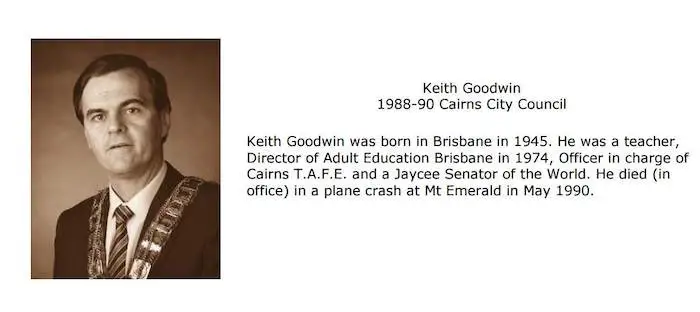
One Bourbon, One Scotch and One Beer
The famous American blues singer George Thorogood had a hit song in my youth called, ‘One Bourbon, One Scotch, One Beer’. I was sitting at the bar in the Grafton Hotel one Friday night, reciting this song and singing the verse to the bartender. She replied, “Do you want anything with the Bourbon and Scotch?” No, I replied, and she promptly served me the three drinks I had ordered. Those drinks disappeared into my mouth quicker than you could say George Thorogood.
I returned to singing and the same thing happened another 4 or 5 times. I do not know if there were responsible service of alcohol laws back then but I doubt it. Regardless, it was not long before the manager had endured enough of me. I remember having words with her on my way out.
Dickhead Behind the Wheel
I decided it was time for a big night on the town, so I jumped into my ageing Toyota Celica. Driving into the city, I saw a car on the side of the highway. Out of curiosity I turned my vehicle in that direction to shine my lights and see who it was. An overweight policeman jumped out onto the road and tried to wave me down. It was a stupid thing to do, as I was travelling at 100km/hr. I swerved back into my lane, missing the custodian of justice (but not by much).
As I passed, I turned my head to see our hero making haste to the driver’s seat of his police Commodore. Realising my Toyota Celica offered me little chance of escape, I decided it might be harder for the policeman to chase me if he couldn’t see me, so I turned off my lights (the sort of decision a drunk person makes).
I saw a road to my right and turned off the highway. In my drunken stupor, I slid off the bitumen onto a gravel road. It was the road to the old Queerah meat-works. Regaining control of the car, I reached another corner. Unfortunately, I saw it too late. It’s hard to notice these things with your lights turned off (duh!). The car then skidded on wet grass for about twenty meters before crossing a drain and hitting into a dirt embankment with one hell of a thud.
Underbelly
I quickly opened the door and took my seatbelt off, unsure how much time I had before our hero had picked up my trail.
There was some bush and a creek about thirty meters away. However, I realised that in my state, I would struggle to cover that distance very quickly. Then I had a brain wave. “These guys are going to think I’ve done a runner anyway, so why not just stay put?” I opened the door completely, then I rolled onto the ground and slid under the car. The Celica was now a couple feet shorter, but it was still good for something. It was no Trojan horse, but I figured most Queensland police officers were not that clever anyway.
Our hero arrived without delay, screeching to a halt in his new beaut late model Holden Commodore police car. He pulled up about two meters from where I lay. He shouted to his partner, “Quick he’s gone into the bush, call for back up”. Within minutes another police car had arrived and two more of Queensland’s finest had made the thirty-yard dash which I had thought better of. I must confess to feeling extremely clever and remember thinking, “even if they do work it out where I am, by the time they find me, I will be sober anyway.”
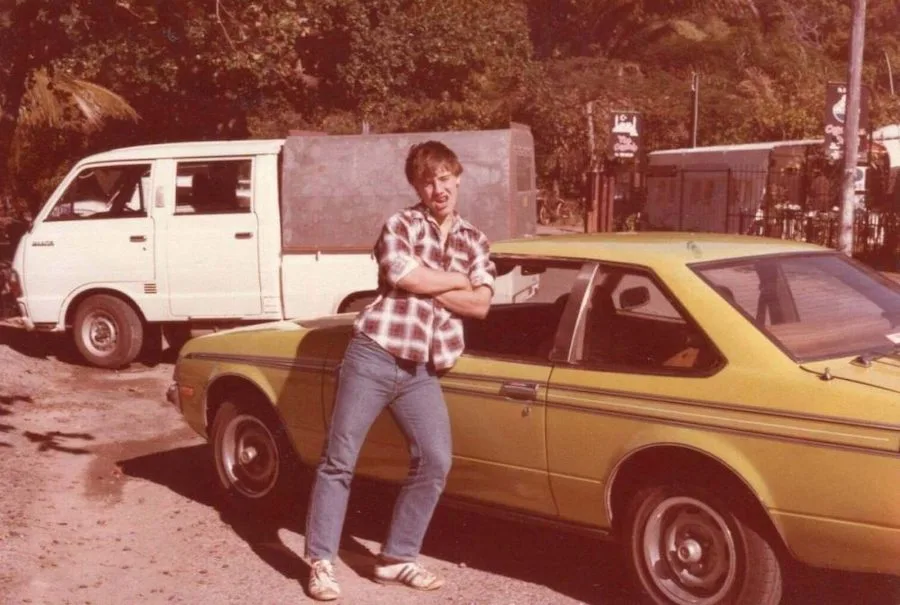
Call the dogs on him
Then our hero returned to some of his fellow law enforcers and I heard him say “I’ve had enough of this, let’s call for the tracker dogs”. I lay there for another twenty minutes, feeling like an uninvited guest at the annual policeman’s ball.
A police van pulled up before long and I heard several dogs being let out. I thought the game was up. To my astonishment the officer in charge of the tracker dogs brought the lead dog over to the car and guided him into the driver’s seat. He said, “pick up the scent boy, and we’ll track this clown”. With that our brilliant blood hound jumped into the driver’s seat took a sniff, jumped out of the car then ran off into the bush. If that wasn’t remarkable enough, the other three dogs followed him.
Journalist ‘Outs’ Rob
I would have made a run for it, but for the fact two officers had stayed with my car. So I lay there for what seemed an eternity, as quiet as a mouse, before I heard Queensland’s finest returning with some four-legged friends. One of them commented, “It’s got me buggered where he’s got to, he just vanished.” I was feeling optimistic at this stage when I heard a female voice say, “Hey, who’s that under the car?” A journalist from the Cairns Post who was with the police to do a story on the dogs had spotted me under the car.
Two burly boys in blue dragged me from underneath my Trojan horse. As I got to my feet, I recognised my pursuer from our previous encounter near the road. He pushed my face into the car and attached a pair of handcuffs behind my back. I was feeling pretty pissed off and said, “Anyhow, did you enjoy your bush walk?” before I burst out laughing.
The officer pushed me to the ground and I felt a very heavy knee in the middle of my back. It was the female journo who found me and I was lucky she was there. If she had not been, I would have copped one hell of a flogging! Needless to say, I spent the night in the watch-house.
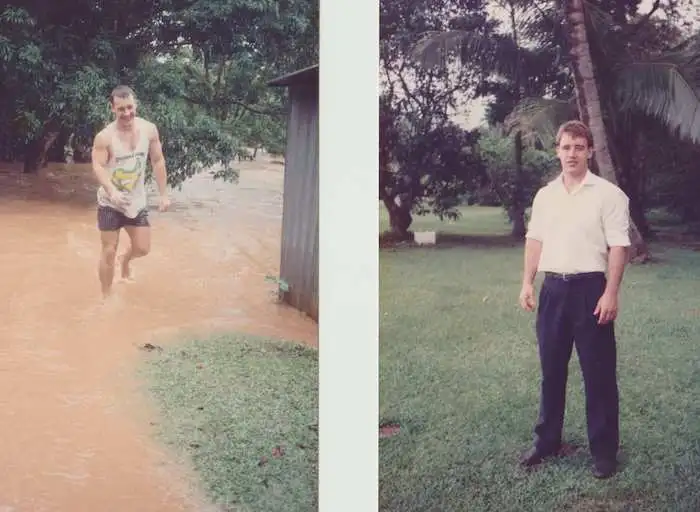
No Defence
There is no way to defend being a dickhead that night, and I would not even try. That said, what happened the following week was concerning. I was still working for the Queensland Government at the Public Trustee. At work, I received a call from the Cairns Police and they asked me to come down to the station for an interview. I said okay, but something was nagging at me. I called a family friend and Cairns solicitor, Mal Cleland, and he said to me, “you’re not going anywhere!” The matter never went any further.
Apparently, the police intention was to make out that I had driven at the police officer (which was not true). I asked myself, “How many people would have been charged and even gone to prison because they just did what the police told them?”
Decades later I saw how politicians looked down on others and condemned young people in trouble. This was part of Queensland political culture. I have never acted in this holier-than-thou manner, and have always been quick to think, “There but for the grace of God went I.”
Rebellion and Settling Down
I had the knowledge and empathy to see how hard life was for many individuals and groups in society. Yet my difficulty with the authorities was a result of a rebellion that lacked direction.
One of my favourite movies was ‘Cool Hand Luke,’ in which Paul Newman takes on violent prison guards. Luke (Newman) fought with a determination that could only lead to his own demise. I felt on a similar trajectory.
Unlike Sam Watson, my rebellion lacked focus and was not directed at resisting the oppression of vulnerable people. However, by the turn of the decade, at least my personal life was becoming less turbulent.
Meeting Jenny
Late in 1990 I accepted an invitation to a 21st birthday party. At the party I saw a young girl with brown hair. Little did I know she would be my future life partner. Jenny loved music and was helping the DJ. I enjoyed speaking with her and was determined to get to know her better.
Jenny later confessed she never thought she would see me again. To her surprise, the next day I had flowers delivered to her workplace at Australia Post. We have been together ever since.
Thinking about how most people around the planet lived, I knew my life was a fortunate one. I had a good job, housing, health and meaningful relationships. While I had empathy and an understanding of class struggle, I had never been a member of an oppressed minority. I had never experienced disadvantage and systemic discrimination. Little to my knowledge, all of this was about to change.
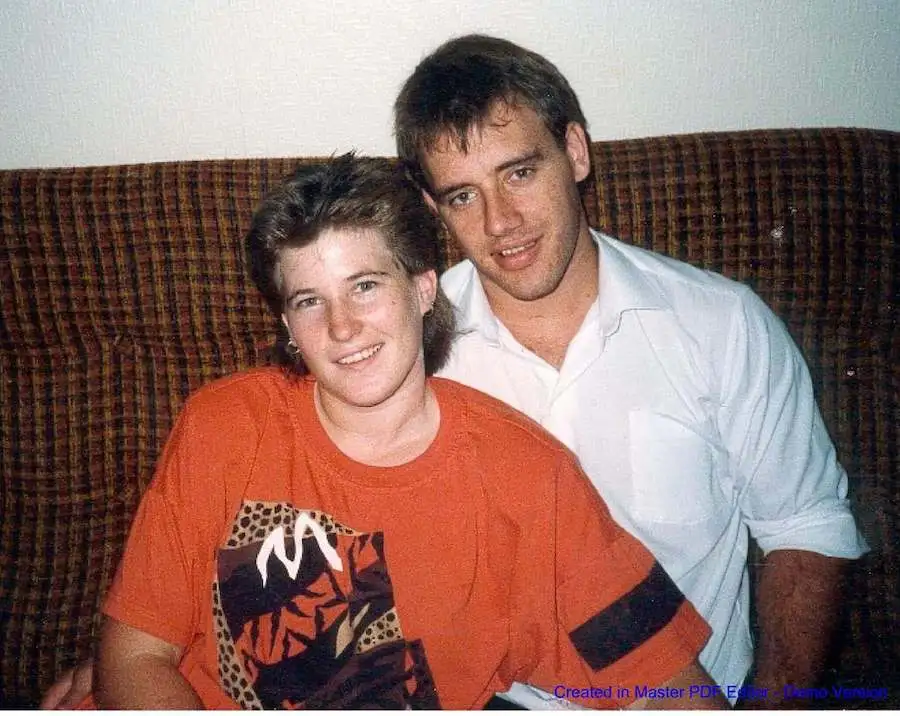
All Chapters
- Far North Queensland
- Growing up in Australia
- Aboriginal and Torres Strait Islander People
- Queensland Political Culture
- Princess Alexandra Hospital Spinal Unit
- People with Disabilities
- Cairns Regional Council
- Conservative Cairns Council
- ALP Qld
- Abortion Law Reform
- Fighting Fossil Fuel
- Local Government Corruption
- Losing to Labor
- My Cairns Council Return
- Council Mayors Silencing Dissent
- Socialist Alliance and Fighting Fascism
- Jenny Pyne, Life and Pain
- Cairns Council Members Swing Right
- Fightback and Farewell
Struggle and Resistance in the Far North
Notes
[1] Interview for “Woman’s Own” magazine, 23 Sep 1987.
[2] ‘Nothing has changed’: why Queensland’s protest battle has raised Joh Bjelke-Petersen’s ghost, Ben Smee, 1 Sep 2019.
[3] ‘Nothing has changed’: why Queensland’s protest battle has raised Joh Bjelke-Petersen’s ghost, Ben Smee, 1 Sep 2019.
[4] Queensland’s Special Bureau, as it was then called, began work in Brisbane in July 1940.
[5] Inside Queensland’s spy unit, Daniel Hurst, 7 April 2010.
[6] ‘Nothing has changed’: why Queensland’s protest battle has raised Joh Bjelke-Petersen’s ghost, Ben Smee, 1 Sep 2019.
[7] Aboriginal leader Sam Watson.

